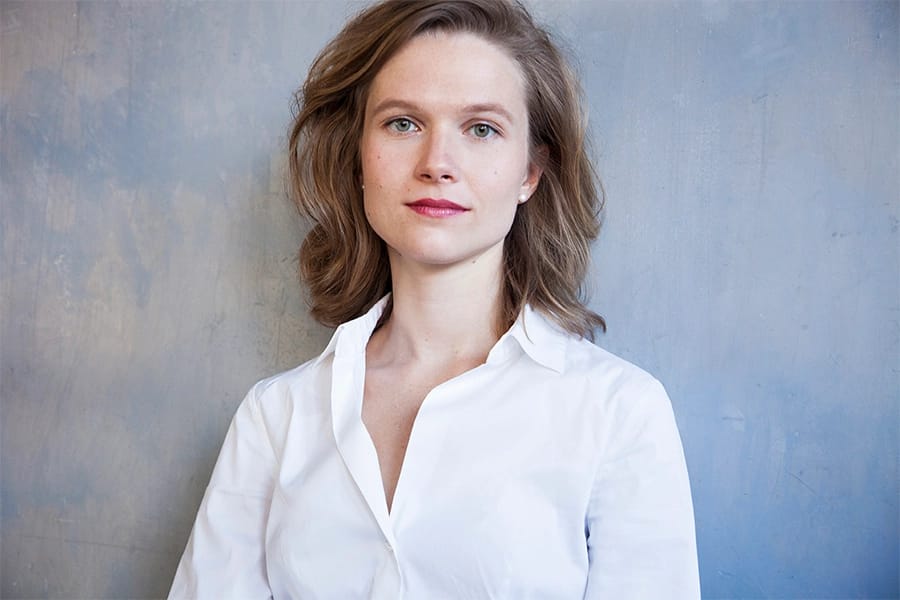 Photo by Frans Jansen
Photo by Frans Jansen
In honor of Women’s History Month, we’re reposting the following interview between KUSC’s Gail Eichenthal and a tremendous up-and-coming force in the classical music world: Los Angeles Philharmonic Associate Conductor, Mirga Grazinyte-Tyla.
“My guess is that before long she will be known simply as “Mirga.” But to call 30-year-old Lithuanian conductor Mirga Gražinytė-Tyla by her first name after her Hollywood Bowl debut… is more out of awe — as we do Napoleon or Joan (of Arc) — than familiarity or convenience.”
Those are the words of Los Angeles Times Music Critic Mark Swed, reviewing Mirga Grazinyte-Tyla’s debut conducting the LA Phil during the Summer of 2014. A former Dudamel Fellow, Grazinyte-Tyla was appointed the Los Angeles Philharmonic’s Assistant Conductor then elevated to Associate Conductor.
In 2015, I caught up with Mirga Grazinyte-Tyla (pronounced Mear-Ga Gra-chin-ee-teh Tie-la) in her Disney Hall dressing following a rehearsal for the Disney Hall concert.
You started in the vocal world, you were a singer and a choral conductor. When did that begin for you?
I was a small child. My father is a choir conductor and my mother is a pianist, but my parents actually thought it would be better if I didn’t have a career in music. They wanted me to have a secure job and knew that to survive as a musician can be very difficult.
At some point did your parents accept that music was simply in your blood and something you wanted to pursue?
Yes. Maybe it was in my blood, but it was also all around me. They would take me to their rehearsals and I was surrounded by music. When I was 11, I knew I wanted a life of music. For our musical education system in Lithuania, that’s late. It’s too late to start learning a stringed instrument, for example, and that’s why I chose choir conducting at our national music school in Vilnius. First I just sang in the choir and then at 13, conducting lessons started. At the beginning, it was just technique and giving cues and holding tempo. Then later, there was working with a choir and doing concerts. We sometimes joke that every second person in Lithuania is a choir conductor because we have this system. Most of the orchestra conductors started with choir conducting.
When did you start getting more serious about orchestra work?
At the University of Music and Fine Arts in Graz, Austria. I started going through the German system for becoming an orchestra conductor, which is different from the Lithuanian one. In Germany, you start at an opera house by playing piano and coaching singers and then you transition to conducting. Opera is a very complex world. I had a conversation with (Finnish Conductor) Susanna Mälkki, who said ‘opera is probably not for perfectionists,’ meaning there are so many different parts to this genre, it’s not about pure music, it’s about telling a story through all of the different arts that come together in an opera.
How would you explain to someone not intimately connected to the orchestral world what exactly a conductor does in a performance?
There are very different approaches to what a conductor should do and what the musicians need. For me, it’s a balance of inspiring the musicians and just giving them clear base for what is happening with tempo, cues, when they have to start and so on. It’s also so much about trusting the musicians. They are all great artists themselves, so you take what they’re giving you, and develop from that communication.
It sounds like respect for the musicians is a very effective way of getting through to them. That maybe sounds obvious, but I’ve seen young conductors showing off what they know—correcting too many little mistakes and losing the orchestra in the process.
I’ve not only seen that, I’ve experienced it. I think it’s a normal part of the process because learning to trust in general is very difficult. All of us want to make things the best we can make, but finding the right way to do that is the question. I definitely had experiences where I was rehearsing and thinking ‘this is important and this is important and this is important’ and among these important things, I lost maybe the most important thing: the orchestra.
One of the things that’s been said about Dudamel is that he embodies the music when he conducts, that the music sort of flows through him to the audience. I imagine that’s a difficult act to pull off.
On one hand, it is a difficult act. Gustavo is magical in how he does what he does. On the other hand, when you spend a lot of time with a piece and really let it come into your body, mind, and heart, then the next step is for the music to flow out from you. The question is how much you go with the flow and how much you focus on the details. Both parts are important, so to find the right mixture is…
Maybe a lifetime’s work?
Definitely.







